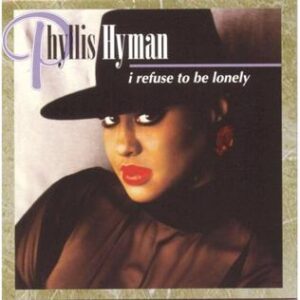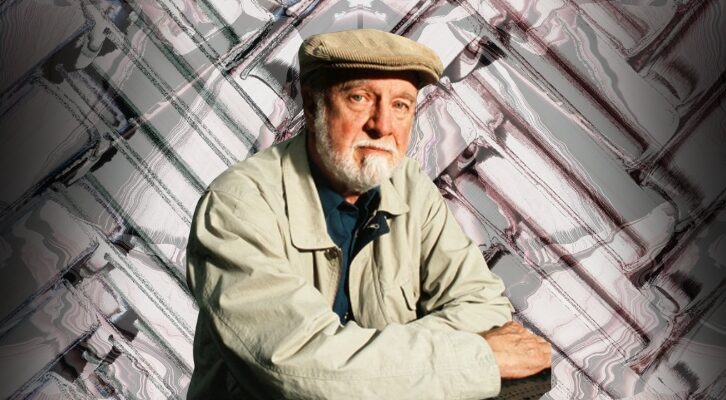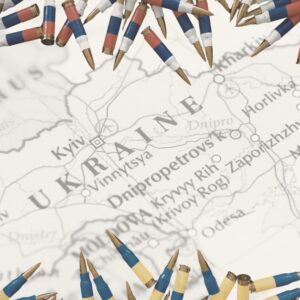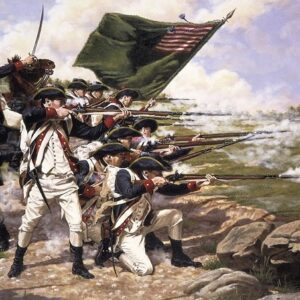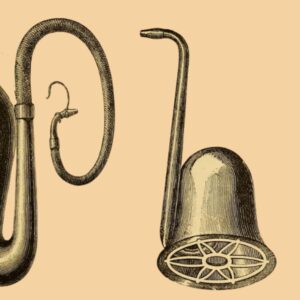
Was I a Torturer in Iraq?
On Practicing "Enhanced Interrogation Techniques" for the US Government
In Baghdad, I run. I run past the canals that feed the artificial lakes of Saddam Hussein’s presidential retreat. The large palaces were all damaged during the initial days of the invasion, but the smaller villas and vacation homes remain largely intact. A variety of American military units have set up their headquarters in the abandoned structures. The roofs are covered in an array of antennas and sandbags. The sun rises and begins to heat the day. I turn around and head back to CACIville. I am passed by armored Humvees and an assortment of tracked vehicles. Mortar rounds strike an empty field. I keep pace with a group of soldiers running in formation.
Brent was wrong. My new team members have not arrived. It will be another week. CACI leaders give me a certificate of appreciation for my voluntary work at Abu Ghraib and Fallujah. I also get a plastic CACI coffee mug and a $10 certificate to spend at the post exchange. I buy Gatorade and Doritos. I’m told to be patient and enjoy the time off. I’m assigned my own room in an old Iraqi army barracks. The room has a door with a lock. It is the first time I’ve been inside a locked room since arriving in Iraq. I go to the room and lock the door.
Ferdinand and I spent our last night together talking about sleep deprivation. It was the first time I remember using the word “torture” in a conversation in Iraq. We both knew the Palestinian chair was torture, but I don’t remember saying it. But sleep deprivation can be described no other way.
That evening, I eventually left the detainee in the room and allowed him to sleep for the rest of the night. When Brent arrived the next morning, I said, “I don’t know, I don’t know what to tell you.” Brent apologized. He said, “Yeah, you know, I don’t think I want to do it anymore, either.”
I write a letter to Karin from the locked room in Baghdad. It is April. My midtour vacation is in May. I write to Karin about traveling in Europe or swimming at a beach in the Maldives, about airplane flights, good food, and bathing suits. I write that I am happy to be gone from Fallujah. I write about my morning runs on Camp Victory. I write about the canals and the artificial lakes. I ask her to send me a new batch of clothes. I need hot-weather shirts. I do not write about sleep deprivation. I do not write about waking up at night to make sure my door is locked.
Bill Jenkins, my new team leader, soon arrives in Iraq. He is a former Army warrant officer with more than twenty years’ experience in the intelligence community. I help him with his gear and give him a tour of the complex. He talks about CACI’s hiring process and about the deployment process at Fort Bliss. He says, “Worst I’ve ever seen.” He talks about the other CACI employees on his flight. He suspects the vast majority of them forged their résumés. He wonders whether any of them have actually served in military intelligence. He says, “Bottom of the barrel.”
Bill and I talk about our new team and the details of our assignment. We are tasked with creating a five-member unit that will support military counterintelligence units and provide expert analysis of emerging trends inside Iraq while offering critical assessments of evolving insurgent capabilities and motivations. I tell Bill I’m not qualified to do this. I tell him I was an Arabic linguist trained to do long-range reconnaissance and that I was a police officer. I say the only emerging trend is more incoming mortars and more angry Iraqis. Bill says, “Just pretend you know what you’re doing.”
* * * *
Easter arrives. The nightmares have become more frequent. On Easter morning, I go for a run on Camp Victory. I explore a new portion of the base where the Army’s 1st Cavalry Division is setting up. A large artificial hill rises out of the empty fields. This is where the workers piled the dirt to dig out the canals and lakes for Saddam’s palaces. Everyone says this is where Saddam Hussein buried the chemical weapons. From the top of the hill I can see the buildings and minarets of Baghdad. I hear the Muslim call to prayer and think about Sunday services at the First Presbyterian Church. I remember an organ prelude accompanied by the Philadelphia Brass, the choir processing down the aisle and singing “Jesus Christ Is Risen Today.” The “Hallelujah Chorus” from Handel’s Messiah. In high school, I used to attend all four Easter services before getting French-kissed in the church parking lot.
A large formation of soldiers from the 1st Cav Division reaches the top of the hill. They stop for push-ups and sit-ups. The sergeant berates the stragglers who are still making their way up the hill. His profanity is interrupted by incoming mortar rounds. We scatter over the sides of the hill and make our way back down to lower ground. I sit with other soldiers in a bunker made of large cement highway dividers. An officer says, “They watch from the minarets. Fucking assholes call artillery on Easter Sunday from a fucking mosque.”
CACI organizes training sessions for newly arrived employees. They ask me to teach Arabic. I sit in a classroom while another employee gives a PowerPoint presentation on the difference between Sunni and Shia. I listen to a speech about the Baath party. There is a class on terrorism. I stand up front and recite basic Arabic greetings. When it’s over, one of the employees organizes everyone into teams. He tells me to say words in Arabic and then call on the teams to see who was paying attention. He uses a whiteboard to keep score. Bill gets up to leave and tells me to come with him. He says, “I didn’t come to Iraq to play games.”
Bill commandeers a vehicle and tells me to show him the airport. We drive to Baghdad International and visit the duty-free shop. We buy whiskey and Cuban cigars. We return to our room and spend the rest of Easter Sunday getting drunk. I had access to alcohol in Fallujah, but I rarely drank. I was too busy, and when I wasn’t busy, I was talking with Ferdinand. There were too many interrogations to conduct. In Baghdad, there is nothing for us to do yet, so I stay drunk for a week. The alcohol dulls the nightmares. Bill watches over me.
* * * *
On April 18, I go back to work. Bill decides that we do not need a five-man team to do the assigned job. He says, “The last thing we need are more CACI guys.” The two of us are attached to an Army intelligence unit tasked with gathering information on the Iraqi workers who enter Camp Victory during the day. They paint the walls, fix the roads, gather the trash, and suck the shit out of the portable toilets. The jobs are highly sought after by Iraqi citizens. The pay is better than anything they can find in Baghdad. Iraqis form long lines at the checkpoints, hoping to land day jobs on Camp Victory.
I arrive at the main gate in the mornings and make my way through long lines of Iraqi citizens. The U.S. military suspects that members of a number of insurgent groups are mixing with the workers in order to gather information about the troops on base. They also suspect they are recording the locations of important buildings in order to facilitate more accurate mortar fire.
I walk among the Iraqis and practice my Arabic. They are eager to speak with someone who knows the language. They think I am someone with influence, so many tell me about their brothers who were taken by American troops, or their fathers who never came home, or their cousins who disappeared last month, or their uncles arrested by the Iraqi police. They complain about the checkpoints that keep them from visiting relatives or the military convoys that make them late for work. They want to know why their child’s school was destroyed and who will be rebuilding it.
I listen to the stories and field the complaints. I pretend to write names down in my notebook and promise to report back when I have more information. More and more Iraqis come to see me and make the same complaints. I make the same assurances. An older man holds my hand and guides me through the crowd. He introduces me to his teenage sons. One of them wears a shirt with the word “Jesus” printed on the front. He shows me the cross he is wearing around his neck, then points at me, then back at himself. He says, “Christian.” They are Chaldean Christians, like Tariq Aziz, the deputy prime minister under Saddam Hussein. Coalition forces arrested Tariq Aziz not long after the invasion, and he is a detainee in an American prison in Iraq.
The old man sits down with me and says something about Abu Ghraib. I struggle with the Arabic, with his accent. I continue to hear the name “Abu Ghraib.” I make out other words, too. He is speaking in the second person. He is speaking about me. He says I interrogated him at Abu Ghraib.
I return to the main gate and spend the better part of the afternoon helping American soldiers inspect Iraqi vehicles entering the base. I translate for the drivers and check worker identification cards. The platoon sergeant arrives, and I tell him about meeting the old man from Abu Ghraib. He says, “Former detainees can’t get on base. We need to take him out of the line.”
I ride back outside the gate with the platoon sergeant and track down the old Christian man and his sons. I wave him over to the vehicle. He thinks I’ve orchestrated a job for him, so he thanks me. We drive the old man onto Camp Victory and place him in a small room. When I enter the room, he smiles. I tell him he’s permanently banned from working on Camp Victory.
* * * *
A few days later, I see Ferdinand again. He, Brent, and Henson have made the trip from Fallujah in order to deliver Michael Bagdasarov to Camp Victory. Bagdasarov was my replacement in Fallujah. He arrived a few days after I left. Abu Ghraib was difficult for him. Fallujah was worse. Ferdinand tells me Bagdasarov’s morale deteriorated quickly. He argued with Captain Dent about release forms, he argued with Brent about working on the night shift, and he argued with Tyner about the legality of the Palestinian chair.
After a particularly difficult day in Fallujah, Bagdasarov had a confrontation with a Marine officer at the dining facility. Bagdasarov was wearing a baseball cap. The officer approached him and told him to remove it. Bagdasarov refused. An argument ensued. Bagdasarov lost his temper, stood up, and pointed his finger in the Marine officer’s face. Bagdasarov was detained and taken to a holding cell. It took Brent all day to retrieve him. When he did, the Marines told Brent to take him back to Baghdad.
I spend the afternoon with Ferdinand, helping him resupply for his return to Fallujah. We visit the post exchange and the duty-free shop at the airport. I tell him he should stay in Baghdad. He tells me to come back to Fallujah. We both agree we won’t be with CACI much longer. I tell Ferdinand I’m still having trouble with the sleep-deprivation thing. He tells me Brent is using the technique more and more. Ferdinand says, “Hey, man, maybe it’s time to say something.” I tell Ferdinand I’m behind him. He says, “No, not me, you. You’re the one who needs to say something. You’re the priest.”
In late April 2004, 60 Minutes broadcasts the photographs of detainees at Abu Ghraib. Some of the activities in the photographs are familiar to me. Others are not. But I am not shocked. Neither is anyone else who served at Abu Ghraib. Instead, we are shocked by the performance of the men who stand behind microphones and say things like “bad apples” and “Animal House on night shift.”
Ferdinand and I stop talking about Abu Ghraib, Fallujah, and sleep deprivation. We don’t want to be identified as the bad apples or the guys in the Animal House. We don’t want to be hung out to dry. We are guilty, but we don’t want to go to jail. Instead, we talk about going home, finding new jobs, and coming back to Iraq. We tell each other we’ll get it right next time. We’ll put our lives on the line. We’ll do it the honorable way. I don’t know how, but we still believe one exists.
Feature image: Marc Quinn, Mirage, 2009.
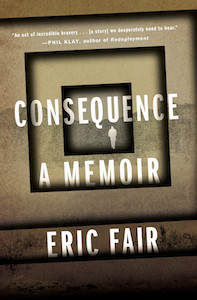
Excerpted from CONSEQUENCE. Used with permission of Henry Holt and Co. Copyright © 2016 by Eric Fair.
Eric Fair
Eric Fair, an Army veteran, worked in Iraq as a contract interrogator in 2004. He won a Pushcart prize for his 2012 essay "Consequence," which was published first in Ploughshares and then in Harper's Magazine. His op-eds on interrogation have also been published in The Washington Post and The New York Times. He lives in Bethlehem, Pennsylvania.









